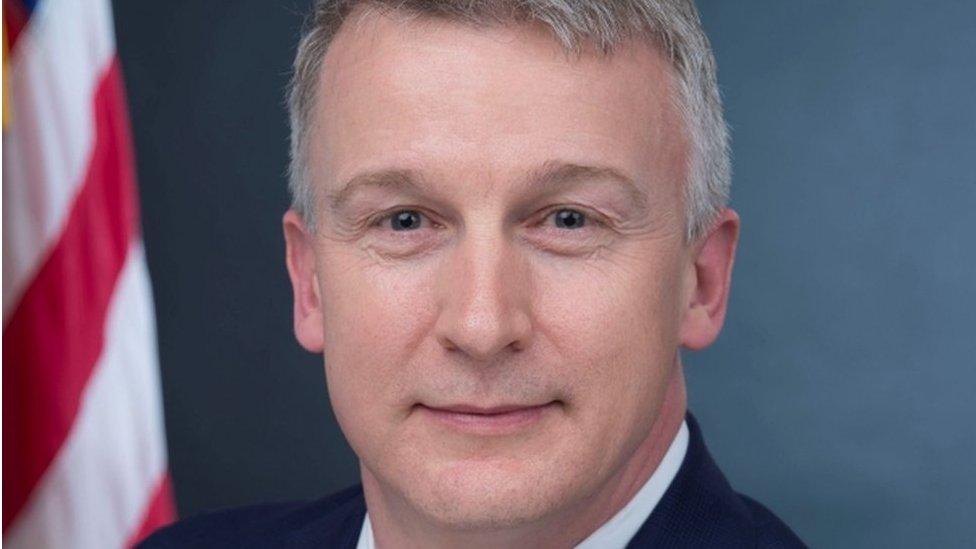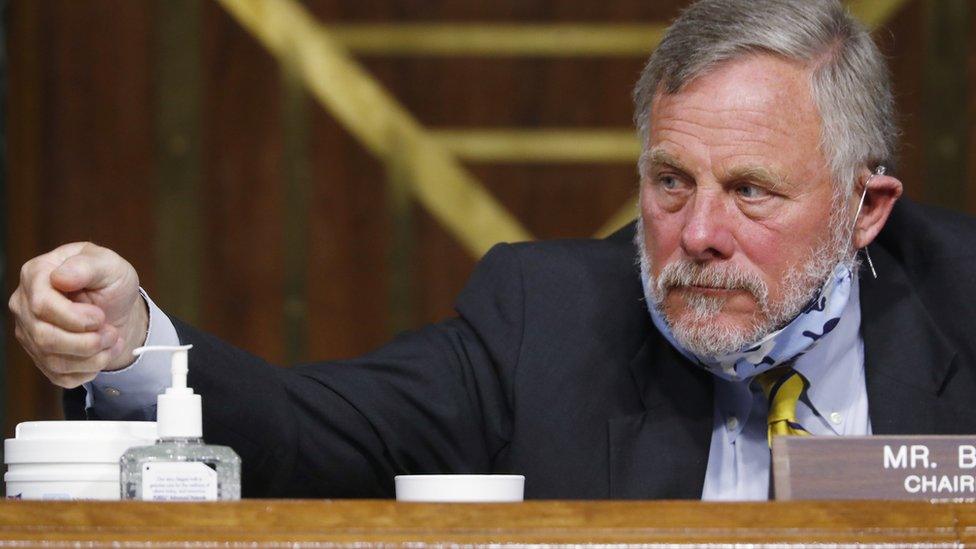Rick Bright: 'Ousted' vaccine expert says US is facing its 'darkest winter'
- Published
Ousted US vaccine supremo's dire warnings
A former top US health official has told Congress the country could face its "darkest winter in modern history" because of the coronavirus.
Rick Bright led the government agency trying to develop a vaccine, but was removed from his post last month.
Mr Bright says he was ousted from the job after refusing to promote an untested drug treatment being touted as a "game changer" by President Trump.
Mr Trump has claimed Mr Bright is a "disgruntled" employee.
Mr Bright also told the House of Representatives subcommittee on health "lives were lost" because of government "inaction" in the early stages of the outbreak.
He said he first spoke out about a medical equipment shortage in January, raising the issue to the "highest levels" of the Department of Health and Human Services (HHS), but "got no response".
In other US developments:
A total of 85,807 people have now died with the coronavirus in the US. New York state continues to have the highest death toll in the US, with 27,607 deaths
Richard Burr, the Republican chairman of the US Senate intelligence committee, has said he will step down while an investigation into allegations of insider trading is carried out. Mr Burr is accused of using inside information to avoid market losses from the coronavirus pandemic
Michigan's state legislature cancelled its Thursday session after receiving death threats and facing more armed protests from right-wing groups campaigning against lockdown measures
Almost a quarter of US workers are now claiming unemployment benefits, after the number of people seeking unemployment jumped by almost three million last week
President Trump's Florida resort Mar-a-Lago will partially re-open this weekend, but guests will need to maintain social distancing, US broadcaster CNN reports, external.
What else did Mr Bright say?
During his testimony, Mr Bright warned that the US's "window of opportunity" to deal with the coronavirus was "closing".
"If we fail to improve our response now, based on science, I fear the pandemic will get worse and be prolonged," he said.
"Without better planning, 2020 could be the darkest winter in modern history."
Mr Bright also told the subcommittee that in January he received an email he would "never forget", from a supplier of medical-grade face masks who warned of a severe shortage.
"He said... we need to act. And I pushed that forward to the highest level that I could of HHS - and got no response."

THE R NUMBER: What it means and why it matters
GLOBAL SPREAD: Tracking the pandemic
VACCINE: How close are we to finding one?
HOW A VIRUS SPREADS: An explanation

Mr Bright said his removal from his post was the result of his insisting that money allocated by Congress to deal with the virus should be put "into safe and scientifically vetted solutions, and not in drugs, vaccines and other technologies that lack scientific merit".
"I spoke out then, and I am testifying today, because science - not politics or cronyism - must lead the way to combat this deadly virus," he added.
Why was Rick Bright removed from his post?
A whistleblower complaint, filed earlier this month, says Mr Bright was removed from his post as director of the Biomedical Advanced Research and Development Authority (Barda) for political reasons.
Mr Bright says he was ousted for refusing to push the drugs hydroxychloroquine and the related chloroquine as potential cures for Covid-19.
Reality Check debunks coronavirus claims by politicians
President Trump had referred to hydroxychloroquine, an antimalarial drug, as a potential "game-changer" in the treatment of Covid-19 - despite many experts cautioning that it could be ineffective or even dangerous.
Research conducted by the Veterans Health Administration in the US which has been submitted for expert review suggests the drug gave no benefits for those taking it, and could actually raise the risk of death for patients in US veterans hospitals.
Mr Bright's complaint alleges that he chose to speak to a journalist because government officials "refused to listen" to his warnings. He said he had an obligation to try and protect the public "from drugs which he believed constituted a substantial and specific danger to public health and safety".
How did Trump respond?
After the hearing, President Trump told reporters: "I don't know him. I never met him. I don't want to meet him.
"But I watched him, and he looks like an angry, disgruntled employee who, frankly, according to some people, didn't do a very good job."
Health secretary Alex Azar claimed officials had followed Mr Bright's recommendations.
"Everything he was complaining about was achieved - what he talked about was done," Mr Azar said.
"He said he talked about the need for respirators. We procured respirators at the president's direction. He said we need a Manhattan Project on a vaccine. We had a Manhattan Project."
The lost six weeks when the US failed to control the virus
- Published24 April 2020

- Published14 May 2020

- Published15 May 2020
